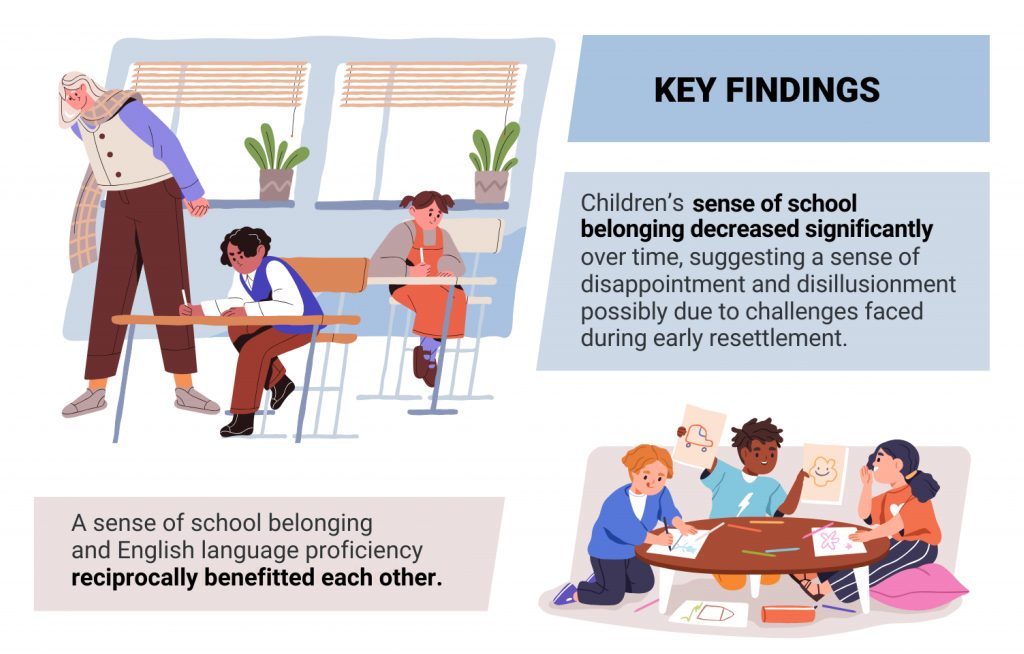Well-Being and Learning: Processes of Resilience in Refugee Children
Researchers: Irene Vitoroulis1, Steve Songtao Wang2, Jennifer Jenkins2, Adriana Soto Corominas3, Redab Al-Janaideh2, Xi Becky Chen2, Kathy Georgiades4, Johanne Paradis5, Alexandria Gottardo6
Affiliation: University of Ottawa1, University of Toronto2, Universitat Internacional de Catalunya3, McMaster University4, University of Alberta5, Wilfred Laurier University6
Keywords: Syrian refugee children, families, resilience, well-being, mental health, sense of school belonging, language learning, bullying, quantitative research, longitudinal study
Jump to: Full infographic, Methodology, Findings, Recommendations, Publications & Reports
Summary
Overview: This study examined the associations between language learning, a sense of school belonging, bullying, and mental health among recently resettled Syrian refugee children over a three-year period. This study is a collaboration with a CYRRC project from the Language and Learning cluster to explore the relationship between learning and well-being in Syrian refugee children.
Objective:
- To examine the trajectory of recently resettled Syrian refugee children’s sense of school belonging over time.
- To investigate the hypothesis that differences in language competence among siblings would affect their mental health, particularly in the context of limited family resources and large family size.
- To test the associations between bullying, a sense of school belonging, and English language proficiency.
Research Justification: Studies have found that students with a higher sense of school belonging tend to have better emotional, behavioural, and academic outcomes. Research also shows that the degree to which refugee children develop a sense of belonging depends largely on the extent to which they acquire proficiency in the host language.
Methodology
This project followed 126 Syrian children (6 to 13 years old) from 71 families who had resettled in Canada. The participants resided in one of three English-majority cities – Edmonton, Waterloo, and Toronto. All participants attended English-language elementary and middle schools (grades 1-8). Most children were in classrooms with other English language learners and monolinguals. They received English-as-a-second-language support through within-classroom programming and/or a pullout system.
Data was collected at three time points over three years. A latent growth model, with the three waves of data modeled over three years, was used to examine participants’ sense of school belonging over time. A sense of school belonging was defined as students’ attachment to school, interest, and faith in the educational environment. A within-family, longitudinal design and multilevel growth curve modeling was used to understand differences in language competence among siblings.
Findings
Sense of School Belonging Over Time:
- There was a significant decrease in children’s sense of school belonging from time 1 to time 2 and a non-significant decrease from time 2 to time 3. Children with higher initial levels of belonging showed greater decreases over time.
- Children start their time in the host country with a positive evaluation of belonging. That their rating of belonging decreases over time suggests a sense of disappointment and disillusionment, possibly due to challenges faced during early resettlement.
- Younger girls exhibited a more significant decrease in school belonging across the three years compared to boys and older girls. Younger girls may be especially vulnerable to experiences of social exclusion and require additional support.
- Younger children with higher war-related trauma experienced less decline in their sense of belonging. Children who have been exposed to war-related trauma may be relieved to be in a safe environment and less sensitive to experiences of social exclusion.
Sense of School Belonging, Bullying & Language:
- There was a reciprocal association between a sense of school belonging and English language proficiency, such that increased language proficiency predicted a higher sense of belonging, and an increased sense of belonging predicted better language proficiency over time.
- Children who reported lower levels of bullying at time 1 had improved English language proficiency at time 2. This suggests a protective social process between experiencing less bullying soon after resettlement and language proficiency.
Language & Mental Health:
- When the participating children first came to Canada, they exhibited mental health problems in the form of externalizing behaviors, however, this decreased over the next two years.
- Faster declines in externalizing behavior were seen by children whose English language competence was higher when they first arrived.
- Children in families with lower parental education and larger families struggled in their adaptation. This was especially true when their own language learning was slower than that of their siblings.
Recommendations
- Schools should create more opportunities for English language learning through formal instruction (e.g., classes) and informal methods (e.g., peer mentoring, English language circles, etc.).
- Teachers and schools need to find ways to foster positive relationships in the early months of children’s resettlement experience. For example, activities or sports that can be done non-verbally and by helping children to mime. Teachers could also track children's sense of belonging within classrooms with the aim of prioritizing this for all children.
- Service providers and policymakers should prioritize language acquisition for language-vulnerable refugee children by utilizing assessment techniques in their origin and host country’s language. Targeting children’s language quickly and effectively could benefit children’s mental health.
- Service providers and policymakers should address resource limitations within refugee families. This may involve offering educational support for parents, providing financial assistance to alleviate economic burdens, providing children from large families with increased access to adults that speak the host country language and can support children in their schoolwork, incorporating sibling support programs within settlement services, and providing opportunities for joint language learning among siblings.
Publications & Reports
Explore more projects



